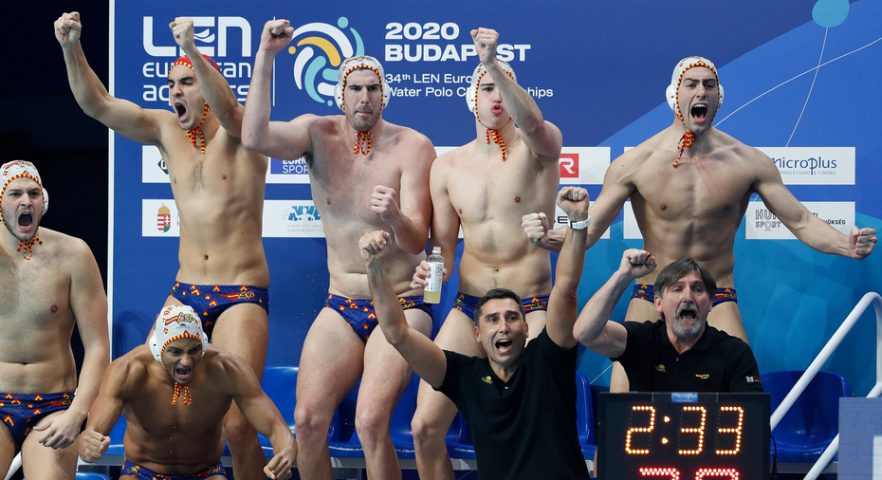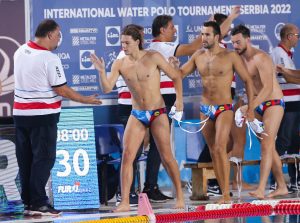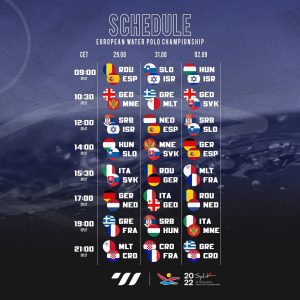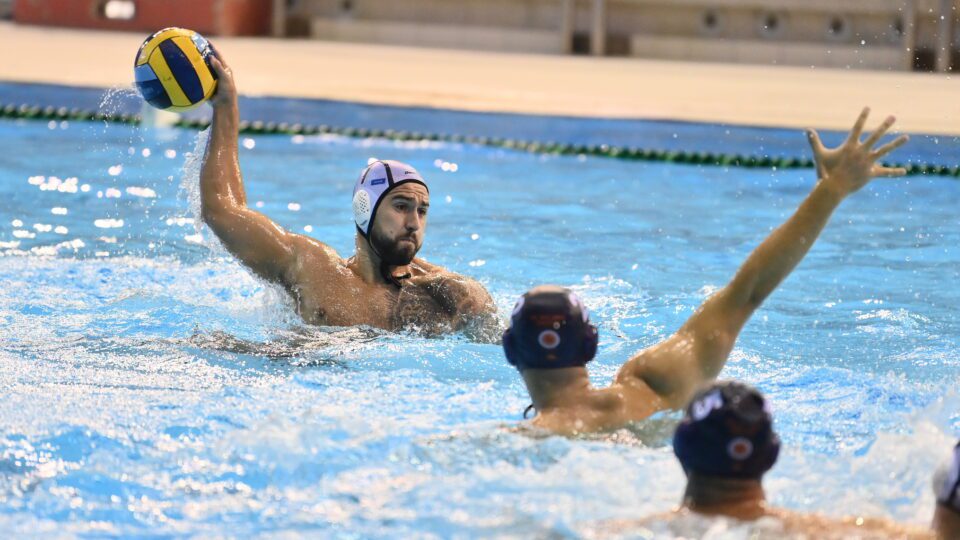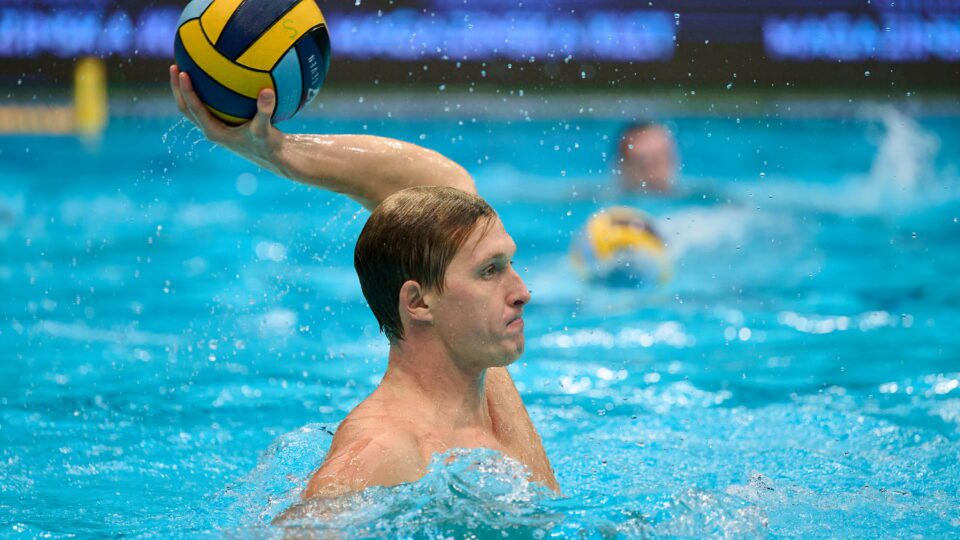Today, we finish Total Waterpolo’s series of pre-tournament articles about the European Championships in Split.
In the last part, we present groups C and D of the male tournament. Three reigning champions are in the “second half” of the men’s Championships – world champion Spain, Olympic champion Serbia and Hungary, which will try to defend the European title won in Budapest two and a half years ago.
These three teams begin their campaigns in Split from different starting positions. Spain has had a great summer. It won the gold medal in the World Championships and bronze in the World League. The previous two major tournaments are the wind at Spain’s back.
Serbia and Hungary didn’t make the semifinals in Budapest. A 7th-place finish in front of the home crowd was a disappointment for the Hungarians, who didn’t qualify for the World League Super Final. Serbia finished in 5th place in Budapest and in the World League in Strasbourg. These results aren’t on the level of the Olympic champions. Still, performances of a rejuvenated team in Budapest, and especially in Strasbourg, and not the results, were what made Dejan Savic unpleased.
To remind you, the competition format is the same as at the World Championships. Sixteen teams are Split into four groups. The four group winners qualify for the quarterfinals, while the 2nd-placed and 3rd-placed will meet in the crossover round (the road to the medals is at the end of the article)
The Split tournament is the European teams’ last qualification competition for World Championships in Fukuoka. Three berths will be available. Spain,Italy, Greece, Croatia and Serbia have already qualified for Fukuoka.
2022 European Men’s Championships, Split, Preview (Part 2)
Group C
SPAIN
Best result in the history of the ECH: three silver medals (1991, 2018, 2020)
2020 European Championships: silver medal
All-time statistics at the Europeans (28 appearances): 195 games (93 wins, 19 draws, 83 losses)
Players to watch: Felipe Perrone, Alvaro Granados,Roger Tahull, Bernat Sanahuja, Unai Aguirre
Head coach: David Martin.
GERMANY
Best result in the history of the ECH (including W.Germany): two gold medals (1981, 1989), bronze as Germany (1995)
2020 European Championships: 9th place
All-time statistics at the Europeans (30 appearances, including West Germany): 213 games (97 W, 21 D, 95 L)
Players to watch: Marko Stamm, Denis Strelezkij, Moritz Schenkel, Maurice Juengling…
Head coach: Petar Porobic.
ROMANIA
Best result in the history of the ECH: 4th place (1993 and 2006)
2020 European Championships: 11th place
All-time statistics at the Europeans (24 appearances): 168 matches (54 W, 18 D, 97 L)
Players to watch: Andrei Prioteasa, Levente Vancsik, Marius-Florin Tic
Head coach: Bogdan Rath.
NETHERLANDS
Best result in the history of the ECH: champion (1950)
2020 European Championships: 15th place
All-time statistics at the Europeans (28 appearances): 169 matches (57 W, 21 D, 91 L)
Players to watch: Jorn WInkelhorst, Lucas Giellen, Bilal Gbadamassi, Jesse Koopman
Head coach: Harry van der Meer
At first glance, goddess Fortuna was with Spain during the draw for the groups of the 35th European Championships. The world champions will face three countries that don’t belong to the European elite at the moment.
The Spaniards have enjoyed an excellent run in big competitions in the past few years. They won three silver and one gold medal at the European and World Championships between 2019 and 2022 and 4th place in the Tokyo Olympics.
Undoubtedly, they are not only the heavy favorites in the group but one of the most serious medal contenders.
Spain hasn’t changed its roster significantly since the Tokyo Olympics. It seems that the team, led by veteran Perrone, Munarriz, Granados, Sanahuja, Lorrio, will have an easy task.
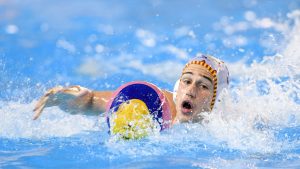
Alvaro Granados (ESP) Photo by Krsto Vulovic/WPF of Montenegro
Still, as David Martin underlined in an interview with Total Waterpolo, Spain respects all rivals and doesn’t underestimate anybody.
Anyway, the battle for 2nd and 3rd place in this group and spots in the cross-over round will probably be very interesting.
Romania, Germany and the Netherlands are teams of similar quality. The Germans and the Dutch have more rich tradition than Romania, they were the European champions, but it was a long time ago. Romania has been more successful than these two nations in recent years. The Romanians won 4th place in 2006. That was the last time that a team that isn’t in a circle of the “Big Seven” reached the semifinals.
That is about the past, and what can we say about the present?
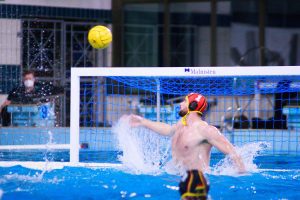
Germany’s goalkeeper and captain Moritz Schenkel Photo: Aleksander Sokler
We don’t forget that Germany played in the quarterfinals of the 2019 World Championships.
Germany has been coached by an experienced Petar Porobic since the beginning of the year. Bogdan Rath has been appointed as the new head coach of Romania recently. Both nations are in the processes of building new teams.
The Netherlands has the most experienced team among these three, but it doesn’t mean it is a favorite. A balanced race for 2nd place is expected. All three sides played in the qualifications and they finished that stage unbeaten. Surely, none of the three teams won’t be satisfied if the qualification for the SPlit tournament remains their maximum.
Group D
HUNGARY
Best result in the history of the ECH: 13-time champion (1926, 1927, 1931, 1934, 1938, 1954, 1958, 1962, 1974, 1977, 1997, 1999, 2020)
2020 European Championships: gold medal
All-time statistics at the Europeans (33 appearances): 220 games (168 W, 17 D, 35 L)
Players to watch: Szilard Jansik, Gergo Zalanki, Krisztian Manhercz, Soma Vogel
Head coach: Zsolt Varga
SERBIA
Best result in the history of the ECH: 5-time champion (2006, 2012, 2014, 2016, 2018)
2020 European Championships: 5th place
All-time statistics at the Europeans (including Yugoslavia – 21 appearances as YUG and SCG, 8 as SRB): 155 games (114 W, 18 D, 23 L)
Players to watch: Dusan Mandic, Sava Randjelovic, Strahinja Rasovic, Marko Radulovic.
Head coach: Dejan Savic
SLOVENIA
Best result in the history of the ECH: 11th place (1999)
2020 European Championships: didn’t play.
All-time statistics at the Europeans: 18 games (2 W, 0 D, 16 L)
Players to watch: Matej Nastran, Martin Pus
Head coach: Kristof Stromajer
ISRAEL
Best result in the history of the ECH: debutant
Players to watch: Tamir Fried, Ronen Gros.
Head coach: Tal Grodman
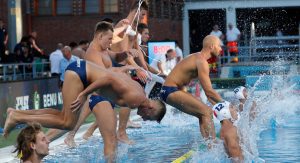
Hungary Photo by Laszlo Balogh/Total Waterpolo
Title-holder Hungary and reigning Olympic champion Serbia wrote many golden pages of the European Championships’ history. Hungary is an absolute record-holder by the number of medals and titles at the continental championships. Serbia is the only team that has won European gold more than once in the 21st century. Moreover, the Serbs have done it five times since 2006 and won two golds as a part of Serbia and Montenegro (2001 and 2003).
But, neither of the teams can’t be satisfied with the results in 2022. Hungary disappointed their fans with 7th place at the World Championships in Budapest. Serbia finished 5th in Budapest and in the same place at the World League Super Final.
Both teams have been rejuvenated not just since the Tokyo Olympics but since the Budapest tournament. Hungary arrives with a new head coach Zsolt Varga, but without two aces who need a rest – Denes Varga and Marton Vamos.
Dejan Savic will count only on three Olympic champions, while 11 Serbian players will debut at the European Championships.
However, regardless of these facts, both teams will target medals. Split is their last chance to reach the podium this year.
Besides two reigning champions, two teams that are far from a circle of medal contenders are in Group D.
The only debutant in the male tournament, Israel, made a great result by qualifying for the European Championships. The water polo federation of this country has had a lot of activities in the last several years. Israel has hosted several World and European Championships for junior and youth categories. The next European senior championships will be held in Tel Aviv so that the team will gain significant experience in Split.
Slovenia played at the European Championships three times. Their best result was 11th place in 1999. The other two times – 2003 (when they were the hosts) and 2006 the Slovenians finished in 12th, last place. Slovenia didn’t play badly in the qualifications, but it was drawn into a very tough group with France and Germany. They finished 3rd and didn’t qualify, but they were invited afterward as the best third-placed team since Russia was suspended.
Oldest and youngest
It’s interesting to mention that the oldest competitor in the male tournament is Slovenia’s Matej Nastran, who was born in 1979. The 43-year-old player participated in the 2003 Europeans held in Kranj.
The second-oldest player in the tournament is a Croat who plays for Georgia Marko Jelaca (born on December 15, 1982)
And who is the youngest player in Split?
Six 18-year-old guys will play in Split. The youngest is Malta’s Sam Gialanze (born on May 27, 2004). Slovenia has three 18-year-old players on the roster: Aleksander Cerar (January 3, 2004), Jasa Lah (January 25, 2004), and Aleksander Paunovic (February 25, 2004). Andrei-Radu-Ionut Neamtu (Romania) was born on April 6, 2004, and Saba Tkeshelashvili (Georgia) on January 14, 2004.
Day 1 (August 29), Schedule
Group A: Georgia – Montenegro (10:30), Italy – Slovakia (15:30)
Group B: Greece – France (19:00), Malta – Croatia (21:00)
Group C: Romania – Spain (09:00), Germany – Netherlands (17:00)
Group D: Serbia – Israel (12:00), Hungary – Slovenia (14:00)
Road to medals
Crossover round (September 4)
Match 1: 2A – 3C
Match 2: 3A – 2C
Match 3: 2B – 3D
Match 4: 3B – 2D
Quarterfinals (September 6)
QF1: 1D – winner match 1
QF2: 1B – winner match 2
QF3: 1C – winner match 3
QF4: 1A – winner match 4
Semifinals: (September 8)
SF1: winners QF1 – QF3
SF2: winners QF2 – QF4
Finals (September 10)
Final: winner SF1 – winner SF2
Matches for classification 3rd – 8th
All medal winners
1926 Budapest: Hungary, Sweden, Germany
1927 Bologna: Hungary, France, Belgium
1931 Paris: Hungary, Germany, Austria
1934 Magdeburg: Hungary, Germany, Belgium
1938 London: Hungary, Germany, Netherlands
1947 Monte Carlo: Italy, Sweden, Belgium
1950 Vienna: Netherlands, Sweden, Yugoslavia
1954 Torino: Hungary, Yugoslavia, Italy
1958 Budapest: Hungary, Yugoslavia, USSR
1962 Leipzig: Hungary, Yugoslavia and USSR (shared 2nd place)
1966 Utrecht: USSR, West Germany, Yugoslavia
1970 Barcelona: USSR, Hungary, Yugoslavia
1974 Vienna: Hungary, USSR, Yugoslavia
1977 Jonkoping: Hungary, Yugoslavia, Italy
1981 Split: West Germany, USSR, Hungary
1983 Roma: USSR, Hungary, Spain
1985 Sofia: USSR, Yugoslavia, West Germany
1987 Strasbourg: USSR, Yugoslavia, Italy
1989 Bonn: West Germany, Yugoslavia, Italy
1991 Athens: Yugoslavia, Spain, USSR
1993 Sheffield: Italy, Hungary, Spain
1995 Vienna: Italy, Hungary, Germany
1997 Sevilla: Hungary, Yugoslavia, Russia
1999 Florence: Hungary, Croatia, Italy
2001 Budapest: Yugoslavia, Italy, Hungary
2003 Kranj: Serbia & Montenegro, Croatia, Hungary
2006 Belgrade: Serbia, Hungary, Spain
2008 Malaga: Montenegro, Serbia, Hungary
2010 Zagreb: Croatia, Italy, Serbia
2012 Eindhoven: Serbia, Montenegro, Hungary
2014 Budapest: Serbia, Hungary, Italy
2016 Belgrade: Serbia, Montenegro, Hungary
2018 Barcelona: Serbia, Spain, Croatia
2020 Budapest: Hungary, Spain, Montenegro
Medal table: 1. Hungary 25 (13 gold, 6 silver, 6 bronze), 2. USSR 10 (5, 3, 2), 3. Serbia 7 (5, 1, 1), 4. Italy 11 (3, 2, 6), 5. FR Yugoslavia/Serbia and Montenegro 3 (2, 1, 0), 6. West Germany 3 (2, 0, 1), 7. SFR Yugoslavia 12 (1, 7, 4), 8 – 9. Croatia 4 (1, 2, 1) and Montenegro 4 (1, 2, 1), 10. Netherlands 2 (1, 0, 1), 11. Spain 6 (0, 3, 3), 12. Germany 5 (0, 3, 2), 13. Sweden 3 (0, 3, 0), 14 – 15. East Germany 1 (0, 1, 0) and France 1 (0, 1, 0), 16. Belgium 3 (0, 0, 3), 17 – 18. Austria 1 (0, 0, 1) and Russia 1 (0, 0, 1).
Note: The first criterion for the rankings is the number of titles, and the second is the number of silver medals.



